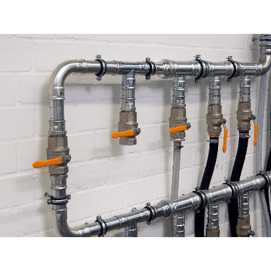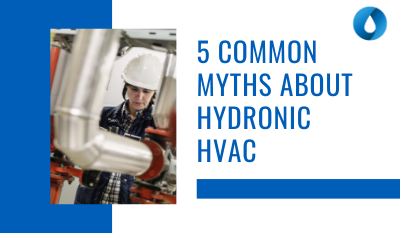We all know how rumors work. One person says something to another, then that person tells someone else. Eventually, we have all these rumors that may or may not even be accurate. Maybe you heard that hydronic HVAC is expensive or maybe someone told you that hydronic HVAC is an extremely energy-efficient option. But how do you really know which of these rumors are true when designing a hydronic HVAC system in your space? We’re here to help a little bit with that. Below are 5 common myths that have been circling around the HVAC industry for years, and we want to help debunk them.

Here are 5 myths about hydronic HVAC:
Hydronic HVAC is Fairly New Technology
Hydronic systems have been around way longer than most of us realize. According to ACHR News, “the earliest recorded use of hot water heating may be that of a monastery in Greenland that used hot spring water to heat the buildings at the end of the 14th century.” So, while Hydronic HVAC systems have come a very long way, especially recently, the concept of using hot water to heat buildings is an age-old process.
Radiant Cooling Causes Condensation
Condensation can occur when warm air collides with cold surfaces, or if there is too much humidity in your space. Therefore, hydronic cooling could cause condensation, but it won’t if it’s designed correctly. There are building standards that recommend how to control moisture and condensation when designing a hydronic HVAC system. You can find these building standards in ASHRAE Standard 160, Criteria for Moisture-Control Design Analysis in Buildings. As HealthyHeating says, “Moisture is the root of all that is good and bad in the universe.” And with the right designers and installers, you won’t even have to worry about moisture in your space.
Hydronic HVAC is Super Expensive
A lot of this comes down to energy efficiency. Hydronic HVAC systems may have higher installation costs for the initial expenses of equipment and installation. But, because water is a better heat transfer medium than air, hydronic heating can be a more energy efficient heating system. Additionally, the temperature of a hydronic cooling system’s water must only be a few degrees beneath the desired indoor comfort temperature, making it a very efficient option. Life-cycle costs could turn out to be significantly lower than other choices due to the efficiency of hydronic HVAC systems.
All Heat Rises
 We’ve all been told over and over again “heat rises.” Almost to the point that people don’t question it or even think twice about the saying. So, heat rises, right? Yes, that’s 100% true. However, not all heat rises. Energy Vanguard discusses the laws of thermodynamics and how heat can move in any direction that it wants depending on the situation. The laws of thermodynamics tells us that “heat moves from areas of higher temperatures to areas of lower temperature.” They also state that “Warm air rises when it’s surrounded by cold air because of its lower density…density is the main factor causing the movement here.” This means you can move heat exactly where you need it most using hydronic systems.
We’ve all been told over and over again “heat rises.” Almost to the point that people don’t question it or even think twice about the saying. So, heat rises, right? Yes, that’s 100% true. However, not all heat rises. Energy Vanguard discusses the laws of thermodynamics and how heat can move in any direction that it wants depending on the situation. The laws of thermodynamics tells us that “heat moves from areas of higher temperatures to areas of lower temperature.” They also state that “Warm air rises when it’s surrounded by cold air because of its lower density…density is the main factor causing the movement here.” This means you can move heat exactly where you need it most using hydronic systems.
The Bigger the Pipe, the More Heat You Get
The bigger the pipe does not actually equal more heat in your space. According to Healthy Heating, “The only significant thing pipe diameter influences in radiant heating is the hydraulics…or the amount of differential pressure it takes to move the water.” Temperature differences is what motivates energy to move. Therefore, it’s all about the temperature, not the diameter when transferring heat through pipes. 
For any additional questions about hydronic HVAC systems, please reach out to your local HTS salesperson!

.png)


.png?height=100&name=HTS_Symbol_RGB%20(2).png)
.png)




Submit a Comment